SCERT AP Board 6th Class English Solutions 8th Lesson Where there is a Will, there is a Way Questions and Answers.
AP State Syllabus 6th Class English Solutions 8th Where there is a Will, there is a Way
6th Class English 8th Lesson Where there is a Will, there is a Way Textbook Questions and Answers
Observe the following pictures :
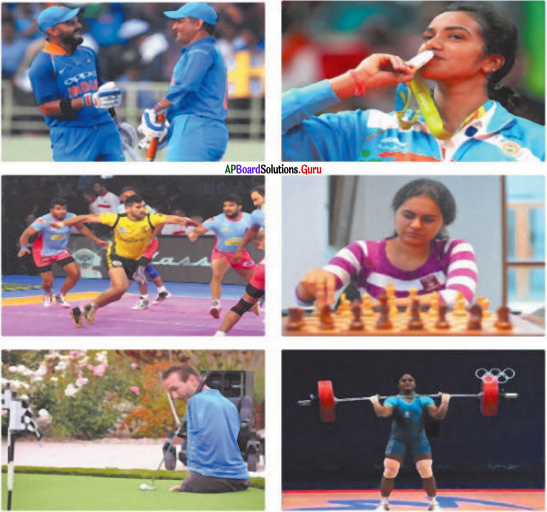
Now, reflect on the above pictures.
(Teachers can interact with the students using the following questions.)
Question 1.
Find out the sports and games shown in the pictures.
Answer:
We can find cricket, badminton, kabaddi, chess, golf and weightlifting.
1) Wilma Rudolph:
As a child, Wilma Rudolph overcame polio to become an Olympic sprint champion. This made her an American icon and a role model.
As,a young child she was paralysed by polio, and contracted both scarlet fever and double pneumonia. Many doctors felt she would never walk again, yet she always believed otherwise. By the time she was 12, she had regained her ability to walk and took up athletics. Eight years later she was an Olympic champion.
Rudolph made her Olympic debut at the 1956 Melbourne Games. Aged just 16, she was a member of the American 4×100 m relay team that claimed a bronze medal.
The 1960 Rome Games provided the defining moments of Rudolph’s extraordinary life story. She stormed to gold in the 100 m, 200 m and 4×100 m relay, breaking three world records in the process. She was dubbed “The Black Gazelle” by the European press for her speed, beauty and grace.
2) Rafer Johnson :
Rafer Johnson’s left leg was badly crushed in a machine in his childhood. Rafer was upset. He grew better day by day and the surgeon could finally save his leg, but it did not heal completely.
Rafer’s interest in sports was so strong that he did not worry about his weak leg. He worked hard day and night and was finally selected for the Olympics. He took part in the decathlon and won the first place. He was called “the greatest all round athlete in the world”.
Reading Comprehension
I. Complete the following statements by choosing the correct options:
1. Wihna Rudolph won three gold medals in _________ .
a) Melbourne Olympics
b) Rome Olympics
c) London Olympics
d) Berlin Olympics
Answer:
b) Rome Olympics
![]()
2. Wilma is a _________ .
a) dancer
b) sprinter
c) singer
d) teacher
Answer:
b) sprinter
3. Wilma’s left leg was weak because _________ .
a) she was injured while playing
b) her leg was affected by polio
c) her legs were crushed by a machine
d) she met with an accident
Answer:
b) her leg was affected by polio
4. Rafer found it difficult to run _________ .
a) with artificial limbs
b) using crutches
c) with blades tied below his knees
d) wearing spiked shoes
Answer:
d) wearing spiked shoes
5. Decathlon is _________ .
a) a competition in ten separate events
b) a set of ten medals given in Olympics
c) a place where Paralympics is held
d) the name of Rafer Johnson’s coach
Answer:
a) a competition in ten separate events
II. Answer the following questions in a phrase or a sentence:
Question 1.
Where were the 1992 Olympics held?
Answer:
The 1992 Olympics were held in Barcelona.
Question 2.
Who are the two athletes mentioned in the text?
Answer:
The two athletes are Wilma and Rafer Johnson.
![]()
Question 3.
Which country did Wilma belong to?
Answer:
Wilma belonged to America.
Question 4.
What was the doctor’s recommendation to improve Wilma’s leg?
Answer:
The doctor recommended regular massage to improve Wilma’s leg.
Question 5.
How did Wilma’s family help her?
Answer:
They spent some time massaging her leg daily.
Question 6.
What happened to Rafer’s left leg?
Answer:
His left leg was badly crushed in a machine.
Question 7.
What do we learn from the lives of these two great athletes?
Answer:
We can learn that physical disability cannot stop the people who have the. true spirit and dedication. We can overcome our physical disabilities with hard work, dedication and sincerity.
III. Go through the following statements and arrange them in a sequential order and write in your notebook.
1. She was in bed for two years.
2. She became well in course of time.
3. Wilma was weak as a baby.
4. She played for her school in one of the matches.
5. She had regular massage of her left leg.
6. She had an attack of polio in her fourth year.
Answer:
- Wilma was weak as a baby. (3)
- She had an attack of polio in her fourth year. (6)
- She was in bed for two years. (1)
- She had regular massage of her left leg. (5)
- She became well in course of time. (2)
- She played for her school in one of the matches. (4)
Vocabulary
I. Who are the following people? (Supply the missing letters)
1. One who participates in a running race is a r ……. …… n …. r.
2. One who takes part in field and track events is an a …. hl…. t ……….
3. One who runs fast in the race over a short distance is a s …….. ………. i ……. t ……. r.
4. One who is injured as a result of a disease is a v….ct
Answer:
- One who participates in a running race is a runner.
- One who takes part in field and track events is an athlete.
- One who runs fast in the race over a short distance is a sprinter.
- One who is injured as a result of a disease is a victim.
![]()
II. Complete the following paragraph choosing the correct word from those given in brackets:
All the students of class VI went to the stadium ………(1)……….. (Some, Sum) of them participated in individual events, a few of them in group events and the remaining
went to cheer up ………(2)……….. (there, their) friends. Rohit was a good runner. When the ………(3)……….. (race, rays) began, all his friends ………(4)……….. (new, knew) that he ………(5)……….. (would, wood) win. In the finals, Rohit ………(6)……….. (one, won) the first ………(7)……….. (prize, price) and became the champion.
Answer:
1) Some
2) their
3) race
4) knew
5) would
6) won
7) prize
Grammar
I. Read the following sentences and observe the words underlined.
1. The front part of one of the toes was hanging out as though it would fall off.
2. I will participate in the match.
3. I can run fast.
4. India might win the match against England.
5. It might rain in the evening so we can’t play cricket today.
6. We should respect our elders.
7. I must take my brother to the stadium.
In the above sentences, the underlined words are Modal Verbs.
Modals are the helping verbs which express the ‘mode’ or ‘manner’ of the actions indicated by the main verbs. They express modes such as ability, possibility, probability, permission, obligation, etc.
The most commonly used modals are shall, should, will, would, can, could, may, might, must, ought to, used to, need and dare.
Modals are used to
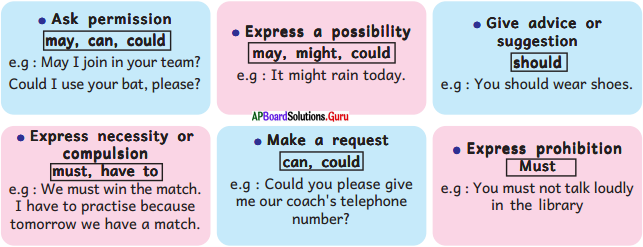
I. Choose the correct modal verbs from the box to complete these sentences.
![]()
1. You …………….. enter the stadium if you have a ticket.
2. We …………….. attend the classes without fail.
3. We …………….. submit our projects on time.
4. …………….. you like to have a cup of milk?
5. We …………….. win the match next week if we practise it every day.
Answer:
1) can
2) should
3) must
4) Would
5) will
![]()
II. Some situations are given below. Read them and respond suitably. The first one is done for you:
1. The teacher has distributed you all the textbooks and notebooks. Your bag is heavy to carry home. You ask someone to help you.
R : Could you please help me carry this bag?
2. A friend has just come to see you at your house. Offer him/her something to drink.
…………………………………..
3. You are at the bank. You want to fill a form but you don’t have a pen. How would you ask the man at the counter for a pen?
…………………………………..
4. You are sitting in a crowded bus. You ndtice an old lady standing near you. Offer her your seat.
…………………………………..
5. Your friend has helped you to locate your missing book. Thank him/her.
…………………………………..
Answer:
2. Would you like to take a cup of coffee?
3. Could you please lend me your pen?
4. Would you like to sit in my seat?
5. Thank you very much!
![]()
III. Questions..Questions ??? (Let’s ask questions, shall we?)
Pair work: Read the interview and practise with a partner.
An interview with a singer :
Interviewer : Can I have a talk with you?
Singer : Sure!
Interviewer : What are you?
Singer : I’m a singer.
Interviewer : Which songs do you sing, I mean pop songs or folk songs?
Singer : I sing folk songs.
Interviewer : Where are you from?
Singer : I’m from Srikakulam.
Interviewer : Why are you here?
Singer : I’m here to participate in a singing competition.
Interviewer : When will you return home?
Singer : I’ll go next week.
Interviewer : How will you go?
Singer : I’ll go by car.
Interviewer : Whose car is it?
Singer : It’s my own car.
IV. Gowthanii is late to school today, Her teacher asks her some questions.
The teacher uses these Question words.
![]()
Task: Complete the questions below using the given Question words.
1. …………… are you late?
2. …………… do you live?
3. …………… everything alright?
4. …………… you miss the school bus?
5. …………… came to drop you?
6. …………… did you reach the bus stop?
7. …………… did you come to School?
8. …………… is the time now?
Answer:
1. Why are you late?
2. Where do you live?
3. Is everything alright?
4. Did you miss the school bus?
5. Who came to drop you?
6. When / How, did you reach the bus stop?
7. When / How / Why did you come to school?
8. What is the time now?
![]()
V. Sit in pairs. Read the following statements and frame questions. Use the clues given in the brackets. One has been done for you.
e.g. A : My father is a teacher.
What is your father? (what)
1. A: This ball is mine.
B: ……………………………..? (whose)
2. A: I like blue colour.
B: ……………………………..? (which)
3. A: We celebrate the National Sports Day on August 29th.
B: ……………………………..? (when)
4. A: Deeksha likes cows because they give us milk.
B: ……………………………..? (why)
5. A: Kohli is my favourite batsman.
B: ……………………………..? (who)
6. A: Neeraja goes to school every day.
B: ……………………………..(where)
Answer:
1. Whose ball is this?
2. Which colour do you like?
3. When do we celebrate the National Sports Day?
4. Why does Deeksha like cows?
5. Who is your favourite batsman?
6. Where does Neeraja go every day?
VI. Write one meaningful question each beginning with the following words.
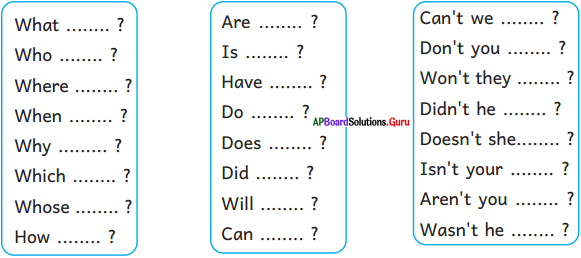
Answer:
What is your name? / What do you like to eat?
Who is your favourite teacher? / Who is your best friend?
Where do you live? / Where do you play in the evenings?
When do you go to movies? / When do you meet your friends?
Why are you late today? / Why do you play games?
Which is your favourite subject? / Which of the drinks do you like most? Whose pen is this? / Whose bicycle is this?
How do you come to school? / How do you reach the bus stop?
Are you ready? / Are you happy?
Is everything ok? / Is the headmaster in the office room?
Have you finished your homework? / Have you finished your lunch?
Do you like coffee? / Do you play cricket?
Does she like sweets? / Does he work hard?
Did you go to school yesterday?
Will you go to a movie next Sunday?
Can you carry a rice bag?
Can’t we eat healthy food?
Don’t you know my name? .
Won’t they go to temple tomorrow?
Didn’t he meet you last Sunday?
Doesn’t she like sweets?
Isn’t your father at home?
Aren’t you hungry?
Wasn’t he at his house yesterday?
Writing
I. Read the information in boxes about the biography of M.S.Dhoni. Arrange them in the right order.
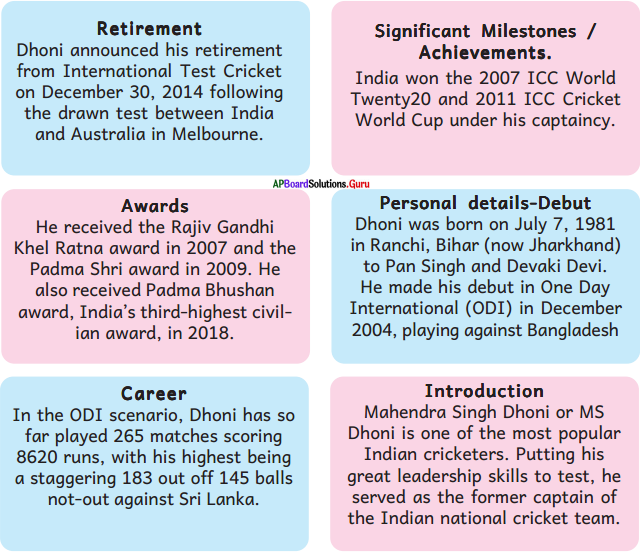
Answer:
Introduction
Mahendra Singh Dhoni or MS Dhoni is one of the most popular Indian cricketers. Putting his great leadership skills to test, he served as the former captain of the Indian national cricket team.
Personal details-Debut
Dhoni was born on July 7, 1981 in Ranchi, Bihar (now Jharkhand) to Pan Singh and Devaki Devi. He made his debut in One Day International (ODI) in December 2004, _ playing against Bangladesh.
Career
In the ODI scenario, Dhoni has so far played 265 matches scoring 8620 runs, with his highest being a staggering 183 out of 145 balls not-out against Sri Lanka.
Significant Milestones /Achievements
India won the 2007 ICC World Twenty20 and 2011 ICC Cricket World Cup under his captaincy.
Awards
He received the Rajiv Gandhi Khel Ratna award in 2007 and the Padrria Shri award in 2009. He also received Padma Bhushan award, India’s third-highest civilian award, in 2018.
Retirement
Dhoni announced his retirement from International Test Cricket on December 30,2014 following the drawn test between India and Australia in Melbourne.
II. Write a biosketch of P.V. Sindhu using the clues given below.
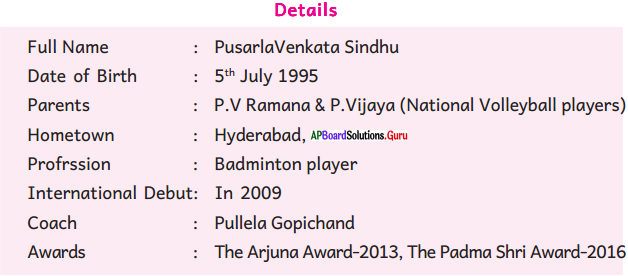
Answer:
P.V.Sindhu’s full name is Pusarla Venkata Sindhu. She was a great badminton player. She was born on 5th July 1995. Her parents are P.V: Ramana and P. Vijaya who are national volleyball players. Her hometown is Hyderabad. Her international debut took place in 2009. Pullela Gopichand is her coach. She received the Arjuna Award in 2013 and the Padma Shri Award in 2016.
Talking Time
I. Respond to the statement: “Alas! We lost the match.”
A: Is it?
B: Really?
C : I know. I expected.
D : Don’t worry!
E : Better luck next time!
![]()
II. Listen to the announcement made by the Physical Director in the District Level Sports Meet.
Announcement 1:
May I have your kind attention please? The sportspersons who are participating in 400 meters are requested to report to Mr. Haribabu by 4 p.m at our High School ground with your identity cards without fail.
Activity 1:
Make an announcement regarding the Volleyball semifinal match between Sompeta and Palasa in court No. 2.
Answer:
Your attention please! The Volleyball teams of Sompeta and Palasa are requested to go to the court No. 2, The semifinal match is going to begin.
→ Activity 2 :
Make an announcement regarding Kabaddi final match between Narasannapeta and Srikakulam in court No. 1.
Answer:
Your attention please! The kabaddi teams of Narasannapeta and Srikakulam are requested to go to the court No. 1. The final match is going to begin.
III. And… what?
Each learner will repeat the sentence and add one more item.
1. Topic : Gajnes and sports
I like/love to play ……….
I love to play cricket, volleyball, ………….
2. Topic : Places
I want to visit /1 would like to visit ………….
3. Topic : Hobbies
I enjoy ………..
4. Topic: Abilities
I can speak English………
5. Topic: Favourites
My favourite sportsperson …………. (game, actor)
Answer:
1. I love to play football.
I like to play chess.
I like to play tennis ……………
2. I would like to visit Madurai.
I would like to visit Kanipakam.
I want to visit Ooty. ………..
3. I enjoy book reading.
I enjoy gardening.
I enjoy listening to music. …………
4. I can speak Sanskrit.
I can lift this heavy box.
I can finish the project by the evening. ……….
5. My favourite sportsperson is Virat Kohli.
My favourite game is cricket.
My favourite actor is Allu Arjun. …………
IV. Read the Interview with Saina Nehwal.
1. An Interview with a sportsperson:

Anchor : Good morning and welcome to all the viewers to your favourite programme’Know Your Stars’. We are so fortunate to have Ms. Saina Nehwal with us on the show Know Your Stars. Well now, let’s invite the first Indian woman player who has brought name and fame to our country and a true inspirer for many sportspersons. Today we will interview her.
Anchor : Dear Saina, once again we welcome you to the show. Our viewers are so . keen to listen to you.
Saina : Good morning everyone. Thanks for inviting me to the show.
Anchor : How did you pick up badminton as your career?
Saina : Well, I had never thought I would be a professional player. But once I got the opportunity to play for my house in the inter-school matches, I defeated all my opponents. Then the sports teacher encouraged me and I became what I am now.
Anchor : Who is your role model?
Saina : I admire Sachin Tendulkar the most. Then Sania Mirza, Kalpana Chawla have also been my inspiration.
Anchor : How do you cope with the pressure of your studies?
Saina : Well, I like my studies. So I spend three hours every day with my studies.
Anchor : What do you do to relax?
Saina : I read books; watch movies; and spend time in nature. It refreshes me completely.
Anchor : What message would you like to give to our viewers?
Saina : Well, in order to be excellent, one must work really hard systematically. And one must never give up in case there are repeated setbacks.
Anchor : Thanks a lot for joining the show. Well that’s all for today and let’s meet another star next week.
Activity : Now conduct an imaginaryjnterview with one of your favourite Sport Stars by using the clues.
Debut match – important people in your life – breakthrough – challenges- tips for young generation – favourite food – favourite place – favourite dish – favourite sportsperson – future plans – goals- funny moment – disappointment – success secret- parents support – role model.
Answer:
Interviewer : Good morning!
V.V.S.Laxman : Good morning! Take your seat.
Interviewer : Thank you. I need an interview with you for my school magazine.
V.V.S.Laxman : OK. We can talk now together.
Interviewer : Tell something about your debut match.
V.V.S.Laxman : It was 20th November 1996 against South Africa.
Interviewer : Who are the important people in your life?
V.V.S.Laxman : My parents, friends and relatives.
Interviewer : What is your breakthrough in your career?
V.V.S.Laxman : My score of 281 runs against Australia in a test match in 2001.
Interviewer : What challenges have you faced in your career?
V.V.S.Laxman : I faced continuous failures in some cases but I overcame them later.
Interviewer : What tips would you like to give to younger generation?
V.V.S.Laxman : It is very important to maintain mental and physical health.
Interviewer : What is your favourite food or dish?
V.V.S.Laxman : I like South Indian varieties.
Interviewer : Which place would you like to visit?
V.V.S.Laxman : Sydney in Australia
Interviewer : Who is your favourite sportsperson?
V.V.S.Laxman : Mohammad Azharuddin
Interviewer : What are your future plans and goals?
V.V.S.Laxman : I want to start a sports school.
Interviewer : Can you tell us any funny movement in your career?
V.V.S.Laxman: In a match, Sourav Ganguly called me for a single and both collided mid pitch as we can in the same line. Both of us went down, Ganguly dropped his bat and got run out.
Interviewer : What is your success secret?
V.V.S.Laxman : Regular practice, hard work and concentration.
Interviewer : How is your parents’ sup’port to your career?
V.V.S.Laxman : They gave me total support to choose cricket as my career.
Interviewer : Who is your role model in cricket?
V.V.S.Laxman : Mohammad Azharuddin.
Interviewer : Thank you for giving information very patiently.
V.V.S.Laxman : It is ok.
Project Work
Collect the information about Rules and regulations, Do’s & Don’ts of a Game : Volleyball: Team – 6 members. Ground Measurements. Foul, Setter, Spiker. Points.
Answer:
Basic Volleyball Rules:
- 6 players on the floor at any one time – 3 in the front row and 3 in the back row
- Maximum of 3 hits per side .
- Points are made on every serve for wining team of rally (rally-point scoring).
- Player may not hit the ball twice in succession. (A block is not considered a hit.)
- Ball may be played off the net during a volley and on a serve.
- A ball hitting a boundary line is in.
- A ball is out if it hits an antennae, the floor completely outside the court, any of the net or cables outside the antennae, the referee stand or pole, the ceiling above a non-playable area.
- It is legal to contact the ball with any part of a player’s body.
- It is illegal to catch, hold or throw the ball.
- A player cannot block or attack a serve from on or inside the 10-foot line.
- After the serve, front-line players may switch positions at the net.
- Matches are made up of sets; the number depends on level of play. 3-set matches are 2 sets to 25 points and a third set to 15. Each set must be won by two points. The winner is the first team to win 2 sets. 5-set matches are 4 sets to 25 points and fifth set to 15. The team must win by 2 unless tournament rules dictate otherwise. The winner is the first team to win three sets.
Volleyball Ground Measurements:
- The official indoor volleyball court size in American measuring units is 29’6″ by 29 feet and six inches for the half court area.
- The full volleyball court area is 59 feet x 29′ 6″.
- If you were using the metric system, then the half court area is 9 meters by 9 meters while the entire court is 18 meters long by 9 meters wide.
- Many people like to round these numbers up to 30 feet by 60 feet.
- The above measurements are the same for both the men’s and women’s volleyball court size.
The DO’s and DON’Ts of Volleyball:
- DO always push yourself!
- DON’T ever dog it
- DO wear your hair in a braid, ponytail, or bun
- DON’T wear it down j
- DO wear crew socks ‘
- DON’T wear* ankle socks
- DO always communicate on the court
- DON’T ever be silent , –
- DO eat plenty of fruits, vegetable, protein, and carbs
- DON’T eat much processed food, candy, chips, and junk
- DO watch volleyball on TV and learn from the best!
- DON’T waste time doing other nonsense
- DO learn all rotations
- DON’T be that person out of rotation
- DO become a well rounded player and be able to perform all skills
- DON’T be tunnel visioned
- DO be coachable
- DON’T be stubborn
- DO set goals
- DON’T be complacent
- DO take initiative when it comes to recruiting
- DON’T be lax
- DO hydrate
- DON’T intake little fluids
- DO build your endurance, flexibility, strength, and agility
- DON’T become out of shape
- DO always pay attention during practices
- DON’T zone out
- DO be a leader
- DON’T be afraid
- DO be early to practices and matches
- DON’T be late
- DO approach coaches when you need soemthing
- DON’T be timid
- DO keep pushing
- DON’T quit!
- DO dream big!!!
Important terms of Volleyball:
Ace :
A serve that is not passable and results immediately in a point.
Assist:
Passing or setting the ball to a teammate who attacks the ball for a kill.
Attack:
The offensive action of hitting the ball. The attempt by one team to terminate the play by hitting the ball to the floor on the opponents side.
Campfire :
A ball that falls to the floor in an area that’s surrounded by two, three, four or more players. At the instant after the ball hits the floor, it appears as if the players are encircling and starting a campfire.
Centerline :
The boundary that runs directly under the net and divides the court into two equal halves.
Dig :
Passing a spiked or rapidly hit ball. Slang for the art of passing an attacked ball close to the floor.
Free Ball:
A ball that will be returned by a pass rather than a spike.
Pancake :
A one-handed defensive technique where the hand is extended and the palm is slid along the floor as the player dives or extension rolls, and is timed so that the ball bounces off the back of the hand.
Rotation:
The clockwise movement of player around the court and through the serving position following a side out.
Serve :
Used to put the ball into play.
Service Error :
An unsuccessful serve in which one or more of the following occurs:
1. the ball fails to clear the net,
2. the ball lands out of bounds, or
3. the server commits a foot fault.
Setter:
the player who has the 2nd of 3 contacts of the ball who ‘sets’ the ball with an overhand pass for a teammate to hit. The setter is like the quarterback in football – they run the offense.
Side Out:
Occurs when the receiving team successfully puts the ball away against the serving team, or when the serving team commits an unforced error, and thus the receiving team gains the right to serve.
Spike:
Also hit or attack. A ball contacted with force by a player on the offensive team who intends to terminate the ball on the opponent’s floor or off the opponent’s blocker.
Fun Time
I. Reverse Me:
Read the sentences and try to guess the words. The first one has been done for you.
e.g.: I perceived with my eyes.( SAW) Reverse me and I existed. (WAS)
1. I’m a heavy weight. Reverse me and I’m nothing ……………
2. I’m the high point. Reverse me and I’m something to cook in ……………
3. I’m uncooked. Reverse me and I’m armed conflict ……………
4. I am a portion of the whole. Reverse me and I’m used to catch something ……………
5. I’m a wild animal. Reverse me and I move like water. ……………
6. I’m a number. Reverse me and I’m used to catch something ……………
7. I’m an obstruction used to hold back water. Reverse me and I’m crazy. ……………
8. I’m victorious. Reverse me and I’m the present time ……………
9. I use it in dance. Reverse me and we keep them at home ……………
Answer:
1. Ton – not
2. Top – pot
3. Raw – war
4. Part – trap
5. Wolf – flow
6. Ten – net
7. Dam – mad
8. Won – now
9. Step – pets
![]()
II. Stretching a Sentence :
Add more details to a sentence by using the 5 “Wh” Questions.
Who ? My childhood friend.
What? My childhood friend has been playing chess.
When (How long)? My childhood friend has been playing chess for the past two hours. Where? My childhood friend has been playing chess for the past two hours in his room.
Why? My childhood friend has been playing chess for the past two hours in his room because he wants to participate in a competition.
Poem
WHAT CAN A LITTLE CHAP DO?
– William Arthur Dunkerely

What can a little chap do?
For his country and for you?
What can a little chap do?
He can play a straight game all through:
That’s one good thing he can do.
He can fight like a?Knigh1
For the Truth arid the Right;
That’s another good thing he can do.
He can shun all that’s mean,
He can keep himself clean,
Both without and within;
That’s a very fine thing he can do.
His soul he can brace
Against everything base.
And the trace will be seen
All his life in his face;
That’s an excellent thing he can do.
He can look to the light,
He can keep his thoughts white,
He can fight the great fight,
He can do with his might
What is good in God’s sight;
Those are truly great things he can do.
Comprehension
I. Match the rhyming words.
| 1. knight | base |
| 2. brace | mean |
| 3. clean | do |
| 4. you | fight |
Answer:
| 1. knight | fight |
| 2. brace | base |
| 3. clean | mean |
| 4. you | do |
II. Read the above poem and fill in the blanks with suitable words.
1. He can keep his ………….. white.
2. He can fight like a ………….. for the Truth and the Right.
3. The one thing he can do is to play a ………….. game all through.
4. The greatest thing that he can do is to do what is good in …………..
Answer:
1) thoughts
2) knight
3) straight
4) God’s sight
III. Answer the following questions.
Question 1.
What can he do to keep all things clean?
Answer:
He can shun all that’s mean.
Question 2.
What can he brace against everything?
Answer:
He can brace his soul against everything.
![]()
Question 3.
What can he do with his might?
Answer:
He can fight the great fight.
Question 4.
What can you do for your country?
Answer:
I love my country. First of all, as a student, I study well and achieve my goal. I respect our government, our Constitution, our national flag and our national anthem. I serve the government as well as the people. I can be free from corruption. I can stand for truth. I try to educate others. I respect others. I can’always try to use my power to uplift our country.
Question 5.
List out the good things you find from the poem.
Answer:
The following are good things mentioned in the poem.
Playing a straight game all through
Fighting like a knight for the truth and the right
Shunning all bad things
Keeping clean within and without
Bracing soul against everything
Keeping thoughts white
Fighting a great fright for good things in God’s sight.
What Can A Little Chap Do? Poem Summary
A little chap is the future citizen of a country. He can do many things for the sake of his country. He can play a straight game. He can fight like a knight for the truth and the right. He can refuse to do mean things and keeps himself clean. He can have a brave heart. He looks for wisdom and thinks wisely. He can fight with his might for what is good in God’s view.
What Can A Little Chap Do? Poem About the Poet
William Arthur Dunkeriey (12 November-1852 23 January 1941) was a prolific English journalist, novelist and poet. He wrote under his own name, and also as John Oxenham for his poetry, hymn-writing, and novels. His poetry includes Bees in Amber: a little book of thoughtful verse (1913) which became a bestseller.He also wrote the poem ‘Greatheart’.